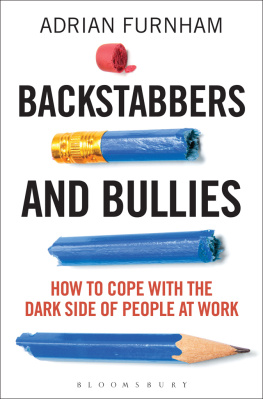How to Cope with Narcissistic and Psychopathic
Abusers and Stalkers
By:
st EDITION
Sam Vaknin
The Author is NOT a Mental Health Professional.
The Author is certified in Counselling Techniques.
Editing and Design:
Lidija Rangelovska
A Narcissus Publications Imprint
Prague & Haifa 2014
2014 Copyright Narcissus Publications
All rights reserved. This book, or any part thereof, may not be used or reproduced in any manner without written permission from:
Sam Vaknin write to:
To get FREE updates of this book JOIN the Narcissism Study List. To JOIN, visit our Web sites : http://www.narcissistic-abuse.com/narclist.html or http://groups.yahoo.com/group/narcissisticabuse |
Visit the Author's Web site http://www.narcissistic-abuse.com
Facebook http://www.facebook.com/samvaknin
YouTube channel http://www.youtube.com/samvaknin
Buy other books, e-books, and video lectures about pathological narcissism and relationships with abusive narcissists and psychopaths here:
http://www.narcissistic-abuse.com/thebook.html
Buy Kindle books about pathological narcissism and relationships with abusive narcissists and psychopaths here:
http://www.amazon.com/s/ref=ntt_athr_dp_sr_1?_encoding=UTF8&field-author=Sam%20Vaknin&search-alias=digital-text&sort=relevancerank
C O N T E N T S
Throughout this book click on blue-lettered text to navigate to different chapters, or to access online resources
Each chapter is a standalone unit. Text such as tips and advice - may, therefore, repeat itself.
- The STALKER
Coping with Stalking and Stalkers
A Typology of Stalkers
Stalkers are not made of one cloth. Some of them are psychopaths, others are schizoids, narcissists, paranoids, or an admixture of these mental health disorders. Stalkers harass their victims because they are lonely, or because it is fun (these are latent sadists), or because they can't help it (clinging or co-dependent behaviour), or for a myriad different reasons.
Clearly, coping techniques suited to one type of stalker may backfire or prove to be futile with another. The only denominator common to all bullying stalkers is their pent-up rage. The stalker is angry at his or her targets and hates them. He perceives his victims as unnecessarily and churlishly frustrating. The aim of stalking is to "educate" the victim and to punish her.
Hence the catch-22 of coping with stalkers :
The standard and good advice is to avoid all contact with your stalker, to ignore him, even as you take precautions. But being evaded only inflames the stalker's wrath and enhances his frustration. The more he feels sidelined and stonewalled, the more persistent he becomes, the more intrusive and the more aggressive.
It is essential, therefore, to first identify the type of abuser you are faced with.
(1) The Erotomaniac
This kind of stalker believes that he is in love with you and that, regardless of overwhelming evidence to the contrary, the feeling is reciprocal (you are in love with him). He interprets everything you do (or refrain from doing) as coded messages confessing your eternal devotion to him and to your "relationship". Erotomaniacs are lonely, socially-inapt people. They may also be people with whom you have been involved romantically (e.g., your former spouse, a former boyfriend, a one night stand) or otherwise (for instance, colleagues or co-workers).
Best coping strategy
Ignore the erotomaniac. Do not communicate with him or even acknowledge his existence. The erotomaniac clutches at straws and often suffers from ideas of reference . He tends to blow out of proportion every comment or gesture of his "loved one". Avoid contact do not talk to him, return his gifts unopened, refuse to discuss him with others, delete his correspondence.
(2) The Narcissist
Feels entitled to your time, attention, admiration, and resources. Interprets every rejection as an act of aggression which leads to a narcissistic injury. Reacts with sustained rage and vindictiveness . Can turn violent because he feels omnipotent and immune to the consequences of his actions.
Best coping strategy
Make clear that you want no further contact with him and that this decision is not personal. Be firm. Do not hesitate to inform him that you hold him responsible for his stalking, bullying, and harassment and that you will take all necessary steps to protect yourself. Narcissists are cowards and easily intimidated . Luckily, they never get emotionally attached to their prey and so can move on with ease.
(3) The Paranoid
By far the most dangerous the lot. Lives in an inaccessible world of his own making. Cannot be reasoned with or cajoled. Thrives on threats, anxiety, and fear. Distorts every communication to feed his persecutory delusions .
From the article "Avoiding Your Paranoid Ex" :
"The paranoid's conduct is unpredictable and there is no 'typical scenario'. But experience shows that you can minimise the danger to yourself and to your household by taking some basic steps.
If at all possible, put as much physical distance as you can between yourself and the stalker. Change address, phone number, email accounts, cell phone number, enlist the kids in a new school, find a new job, get a new credit card, open a new bank account. Do not inform your paranoid ex about your whereabouts and your new life. You may have to make painful sacrifices, such as minimise contact with your family and friends.
Even with all these precautions, your abusive ex is likely to find you, furious that you have fled and evaded him, raging at your newfound existence, suspicious and resentful of your freedom and personal autonomy. Violence is more than likely. Unless deterred, paranoid former spouses tend to be harmful, even lethal.
Be prepared: alert your local law enforcement officers, check out your neighbourhood domestic violence shelter, consider owning a gun for self-defence (or, at the very least, a stun gun or mustard spray). Carry these with you at all times. Keep them close by and accessible even when you are asleep or in the bathroom.
Erotomanic stalking can last many years. Do not let down your guard even if you haven't heard from him. Stalkers leave traces. They tend, for instance, to 'scout' the territory before they make their move. A typical stalker invades his or her victim's privacy a few times long before the crucial and injurious encounter.
Is your computer being tampered with? Is someone downloading your e-mail? Has anyone been to your house while you were away? Any signs of breaking and entering, missing things, atypical disorder (or too much order)? Is your post being delivered erratically, some of the envelopes opened and then sealed? Mysterious phone calls abruptly disconnected when you pick up? Your stalker must have dropped by and is monitoring you.
Notice any unusual pattern, any strange event, any weird occurrence. Someone is driving by your house morning and evening? A new 'gardener' or maintenance man came by in your absence? Someone is making enquiries about you and your family? Maybe it's time to move on.
Teach your children to avoid your paranoid ex and to report to you immediately any contact he has made with them. Abusive bullies often strike where it hurts most at one's kids. Explain the danger without being unduly alarming. Make a distinction between adults they can trust and your abusive former spouse, whom they should avoid.
Ignore your gut reactions and impulses. Sometimes, the stress is so onerous and so infuriating that you feel like striking back at the stalker. Don't do it. Don't play his game. He is better at it than you are and is likely to defeat you. Instead, unleash the full force of the law whenever you get the chance to do so: restraining orders, spells in jail, and frequent visits from the police tend to check the abuser's violent and intrusive conduct.
Next page










